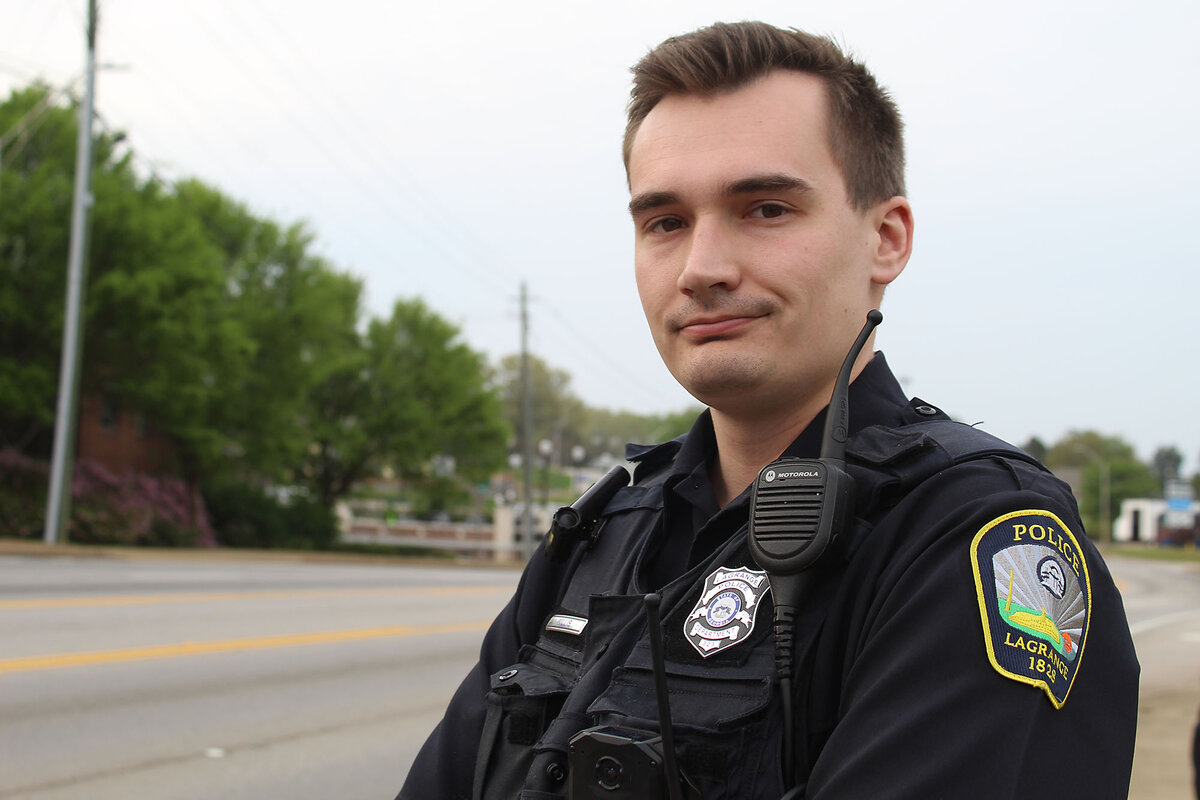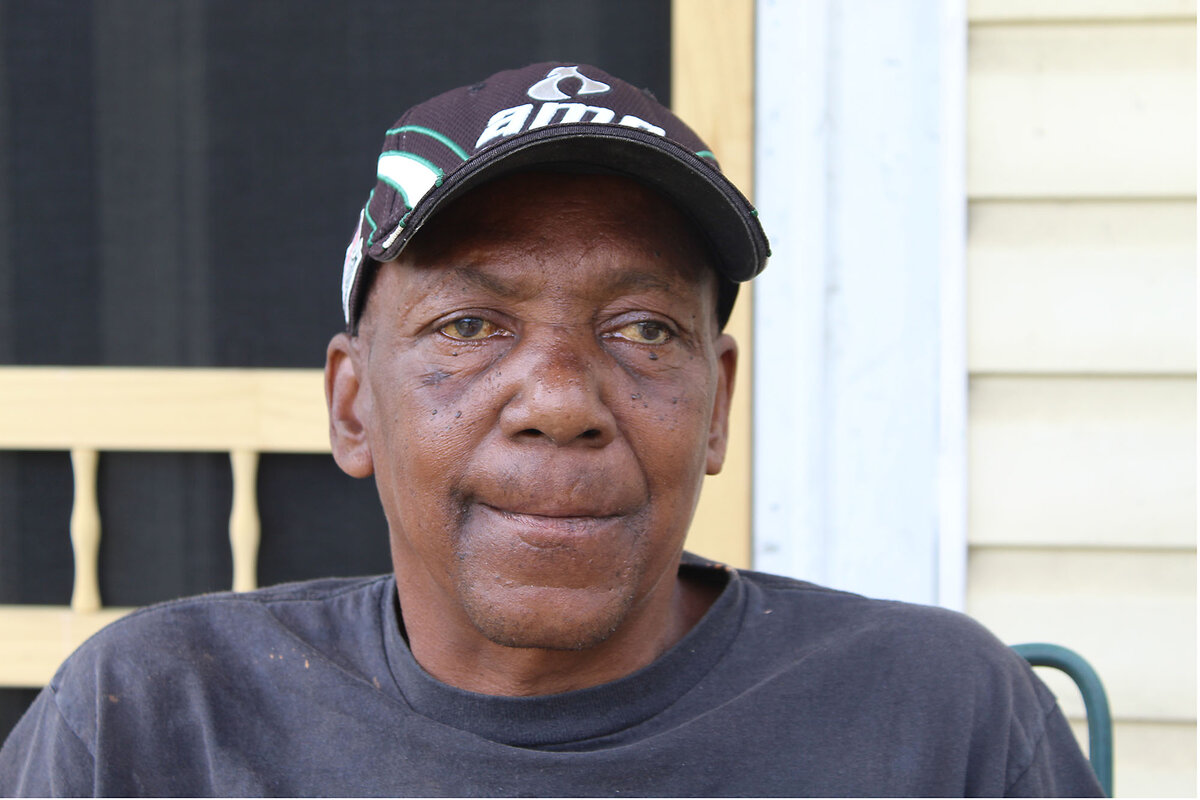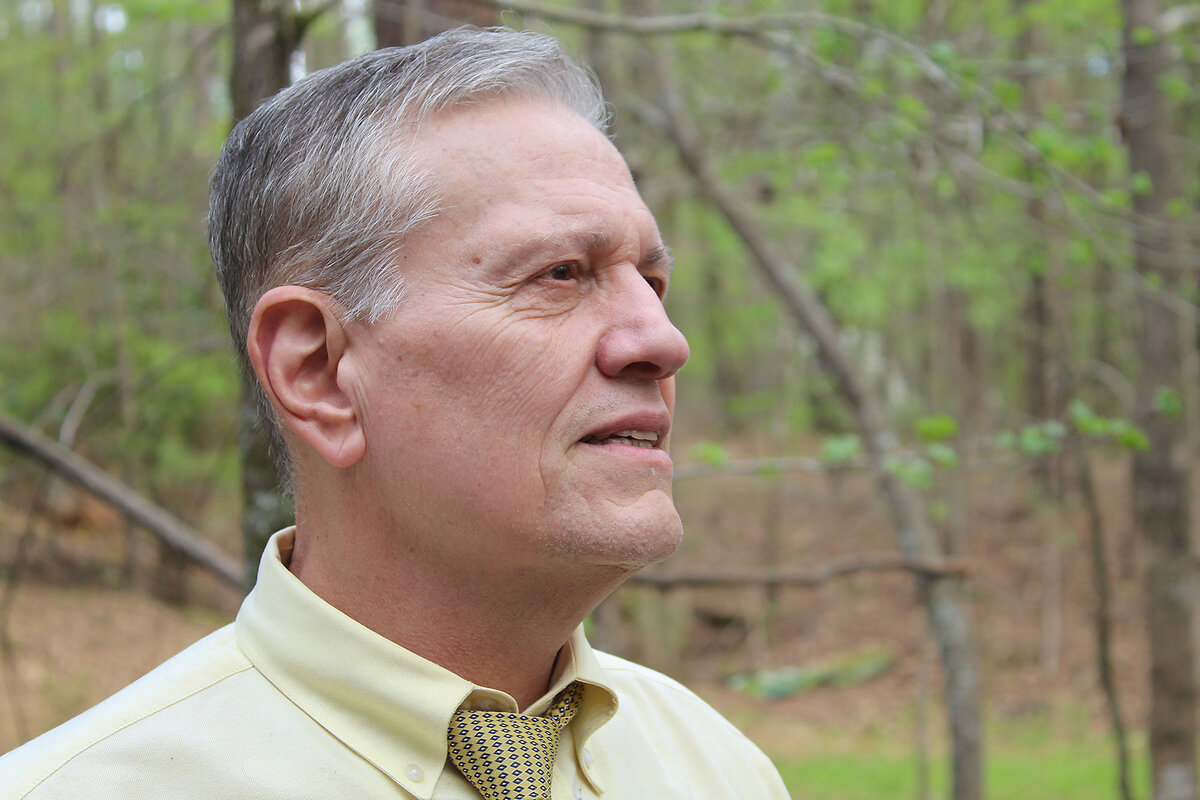Distrust of police persists. This Georgia city may have a solution.
Loading...
| LaGrange, Ga.
Despite falling U.S. crime rates, public trust in police hasn’t improved in recent years. If anything it has declined a bit since 2020, according to polling by Gallup.
Police departments across the United States are trying not only to build trust, but also to reestablish expectations of police – and show how more equitable policing prevents crime and protects officers, too.
Why We Wrote This
A story focused onRespect between citizens and police is critical to society. One police department is showing how better relationships ward off trouble. Since it began rebuilding trust, crime has been cut in half.
“We’re stronger and better together” is the slogan of a local sheriff candidate here in central Georgia.
Over a dozen Georgia jurisdictions are now taking “a social worker approach” to help those entangled with law enforcement but who struggle with mental health as well.
In one study of policing spanning three cities in Texas, Arizona, and Massachusetts, researchers saw crime drop by 14% in high-crime areas where officers were trained to be more respectful and communicative.
In Georgia, the LaGrange Police Department has also shown that better policing is possible and can drive down crime, which has fallen by half.
“There is good evidence that when interactions with police improve, crime goes down,” says Neil Gross, a sociologist at Colby College.
It could have all ended very badly.
After a LaGrange resident’s car was repossessed, the man’s entire family – his son, his son’s fiancée, and their baby – engaged in a high-speed chase through downtown LaGrange, with the family using another car to chase the person who repossessed their car, weaving through traffic at high speed.
When police finally stopped the cars, emotions ran high. Their faces deep in concern, the LaGrange Police Department officers talked calmly with all involved until passions subsided.
Why We Wrote This
A story focused onRespect between citizens and police is critical to society. One police department is showing how better relationships ward off trouble. Since it began rebuilding trust, crime has been cut in half.
“It’s important to remember that everyone involved is human – and humans get emotional,” said Officer Braxton Willis as the scene cleared. “Part of our job is managing those emotions.”
Ultimately, peace prevailed. The police arrested the driver for reckless driving, gave the son a ticket for disorderly conduct, and put the fiancée, who was having breathing problems, in an ambulance. The baby looked on calmly from the arms of his grandmother, who arrived at the scene after the traffic stop.
Three years ago, Officer Willis entered a profession in deep flux as police departments across the United States confronted not just local crime waves but a national uproar on equity and civic rights. Now, Officer Willis’ department in this town of 30,000 people about an hour’s drive outside Atlanta is at the front of that debate – experimenting with how new policies aimed at addressing race and class disparities can dovetail to produce a more effective force.
At heart of these nationwide efforts are questions around whether policing can live up to its “serve and protect” ideals. That takes not just updating rules, but also moving police culture toward more democratic values.
“I’ve started to see some movement on that front,” says sociologist Neil Gross, a former Berkeley, California, police officer who now teaches at Colby College in Waterville, Maine. “Police have taken that movement seriously beyond slogans.”
A tale of three cities
In a three-city study of policing in Houston; Tucson, Arizona; and Cambridge, Massachusetts, researchers saw crime drop by 14% in high-crime areas where officers were trained to be more respectful and communicative, according to a report published in Proceedings of the National Academy of Sciences. Another study of door-to-door visits by police officers in New Haven, Connecticut, resulted in greater support by citizens for boosting department funding.
If there’s progress, that doesn’t mean experts on criminal justice are entirely happy with trends in U.S. policing. Some departments continue to violate civil rights. The recent sentencing of a “goon squad” of white officers that tortured Black citizens of Mississippi’s rural Rankin County is proof of that.
Even in places without such horrific behavior, watchdogs say things like racial profiling and excessive force by police remain common.
“The question ... becomes: What is the definition of ‘respect’?” Michael Collins, senior director of state and local government affairs at the social justice organization Color of Change, says in an email response to questions from the Monitor. U.S. police, he notes, continue to perpetrate violence at world-leading rates, particularly against communities of color. “That is not respect, and anyone in contact with [police] knows it.”
Despite falling U.S. crime rates, public trust in police hasn’t improved in recent years, according to national polling by Gallup. If anything it has declined a bit since the protests following the 2020 murder of George Floyd by a police officer in Minnesota.
Political leaders have squabbled over whether police should be less aggressive or, as former president Donald Trump has suggested, “not be so nice” to suspects.
Yet “nice” appears to have some momentum.
The power of nice in LaGrange
LaGrange Police Chief Louis Dekmar, now recently retired, went on a mission to build trust through good will. He is hardly alone.
From California to Tennessee, a policing movement that focuses more on problem-solving and affirming the value of police presence is part of a deeper realization by law enforcement that “if we don’t change, others will do it for us,” as former Chief Dekmar says in an interview.
LaGrange residents agree. “We want police,” says LaGrange resident Isaiah Wright. But “we just don’t want police who always treat us as suspects of a crime.”
At the core of the effort is not just building trust, but also reestablishing expectations of police – and how more equitable policing can, in fact, work better for fighting and solving crime, while protecting officers as well.
The “kinder is better” mantra isn’t just in police departments. “We’re stronger and better together” is the campaign slogan of a local sheriff candidate here in central Georgia.
Over a dozen Georgia jurisdictions now have units taking what they describe as “a social worker approach’’ to better work with those entangled with law enforcement but who struggle with mental health as well.
Savannah, Georgia, now has more female officers per capita than New Zealand, the nation with the highest percentage of female cops. This old, coastal American city emphasizes how some female officers tend to take a softer approach.
“Bad cop turns good cop” approach
Other cities and counties across the U.S. are also trying this time-tested “bad cop turns good cop” approach. Stockton, California; Longmont, Colorado; and New Orleans are all standout cities working to create friendlier police cultures, some experts say, by asking officers to treat others the way they want to be treated. The value of hiring more skilled police officers also seems to be gaining ground. Last year, Alameda, California, began offering $75,000 hiring bonuses to new recruits.
“Kindness and understanding – the same types of traits you want in a best friend – also work in the domain of law enforcement,” says psychologist Christian Hart, a professor at Texas Woman’s University in Denton.
What the LaGrange Police Department has shown is not just that better policing is possible, but also how it can be done in a way that drives down crime.
Some moves are simple. The police department inserted the word “compassion” into its credo. Other policies are aimed at eliminating disparities of class and race when it comes to criminal justice outcomes.
Some examples:
- LaGrange allows officers the option of shoot-to-incapacitate an armed attacker instead of aiming for more lethal center mass, the U.S. standard. The policy has saved one life so far.
- The department has worked with auto parts stores to develop a coupon program that serves as a proactive, “solve the problem” warning for tail light violations. Hundreds of coupons have been given out, alleviating pressure on the courts and building goodwill.
- The department instituted a confidential “handle with care” bulletin that goes out to the local school system when a student has been involved in a police situation, so as not to revictimize innocent people in case they struggle at school as a result. Chief Dekmar says regular such bulletins go out, shielding minors from being victimized.
Talking it out
Wyoming-born and a “Southerner by choice,” Mr. Dekmar was well into his 30-year career before experiencing a professional epiphany. Even before the killing of 18-year-old Michael Brown by police in Ferguson, Missouri, and the national concerns arising out of that 2014 event, Mr. Dekmar was in dialogue with a local outreach committee about police practices.
In 2017, in an unusual but effective move, Mr. Dekmar apologized to his community, on behalf of local law enforcement, for the 1940 death of Austin Callaway, a young Black man taken from jail and lynched by six white men, a crime abetted by the LaGrange Police. Community heads turned.
“Until that point, I didn’t understand how history intertwined with the present in a powerful way,” says Mr. Dekmar. “It is incumbent upon police to step forward and start engaging in a way that develops trust.”
David Mixon could be Exhibit A.
During a long prison stint for robbery and kidnapping, Mr. Mixon had been called, per policy, by his last name. But when he transferred to the LaGrange Police Department, everybody began calling him David. At first, it made him uncomfortable. Growing up in Atlanta, he had in the ’80s watched police officers brutalize residents.
Fresh starts, new approaches
But the humanity that he felt when the LaGrange officers used his given name became a “new name” moment. A fresh start. It “changed my whole outlook on law enforcement as a whole,” he says.
Now a free man, Mr. Mixon wears police gear as an Animal Control officer. Responding to calls, he offers the same courtesy – listening to animal owners, educating them, and, as a last resort, writing them a ticket or seizing mistreated animals. It’s not easy, he admits. “It can get crazy out there.”
In the past few years, departments across the country that lean into compassion are seeing results.
In LaGrange, during Chief Dekmar’s tenure, overall crime fell by half. The city’s murder-solve rate – often a gauge of police-community cooperation – has gone from 79% in 2012 to 84% last year. The historic average for surrounding Troup County, which has half as many homicides, was 55% between 1965 and 2022. For nearby Bibb County, it was 68% over that same period.
Critics have blasted such approaches as soft on crime and “woke,” and voters in many jurisdictions still demand tougher measures.
“Broken windows” policing in the 1990s showed that crime can indeed be deterred by aggressive posture on the street. But it shattered trust in many neighborhoods.
“There is good evidence that when interactions with police improve, crime goes down,” says Professor Gross at Colby.
Why that’s true is not yet fully understood. But it suggests that the issue is not police authority itself but the way authority is exercised. For much of the modern era, police authority in America has been tied to the badge and the gun. But when authority is granted by the community, it can have a noticeable impact.
That is “legitimate authority ... where everyone recognizes their authority and wants them to have that,” says Professor Hart, the director of the Human Deception Laboratory at Texas Woman’s University.
Back at the road rage incident in LaGrange, the baby’s grandmother said she didn’t agree with the charges. But she noted that the local officers had managed a fluid situation well.
“They’re trying to be better than they were,” she says.











